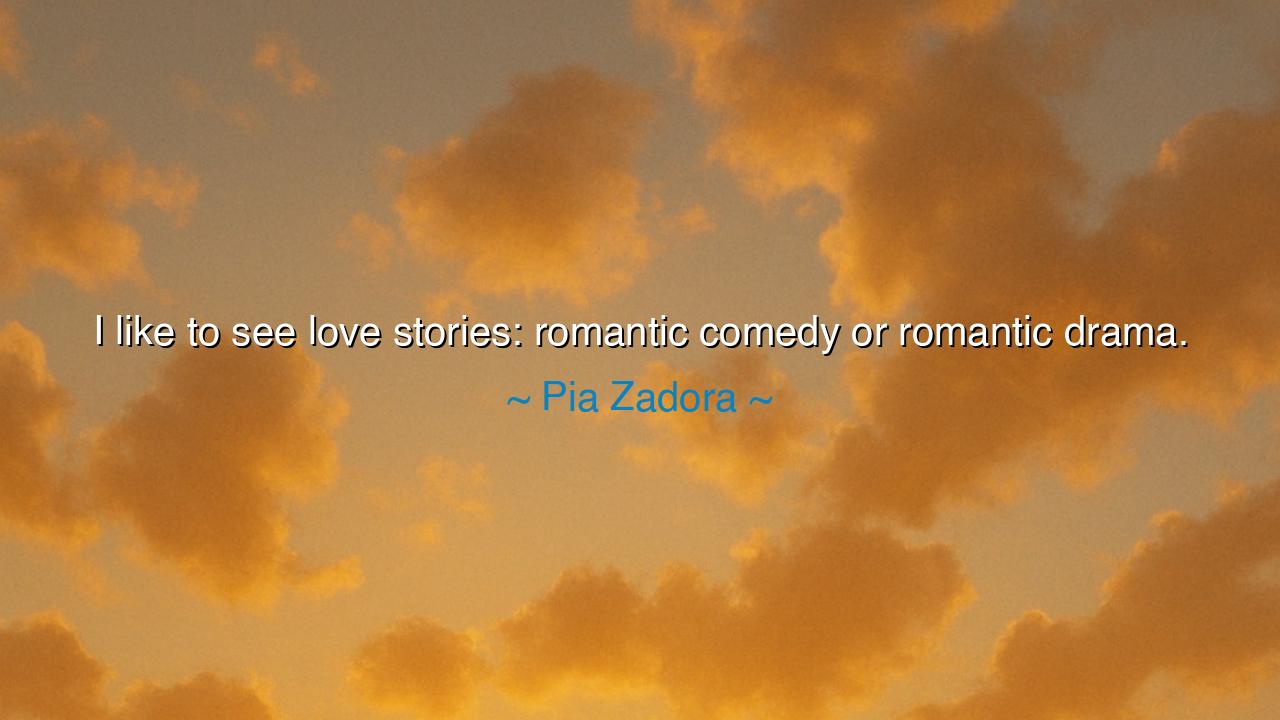
I like to see love stories: romantic comedy or romantic drama.






“I like to see love stories: romantic comedy or romantic drama.” Thus spoke Pia Zadora, and though the words are light, they point toward one of the deepest truths of the human condition—that the heart longs to see itself reflected in tales of affection, joy, trial, and reconciliation. For from the beginning of time, men and women have gathered around fires, in theaters, and before glowing screens, drawn not only to stories of conquest and war, but to the gentler and yet no less powerful struggles of the human heart.
The ancients themselves cherished such stories. In the myths of Greece, the laughter of romantic comedy can be heard in the tale of Persephone’s playful defiance, while the weight of romantic drama resounds in the sorrow of Orpheus and Eurydice. The duality Zadora names is eternal: one face of love is laughter, misunderstandings, and joyful union; the other is sorrow, sacrifice, and the dignity of loss. Both are needed, for without comedy love is too heavy, and without drama it is too shallow.
Consider the story of Shakespeare, who embodied this truth more perfectly than most. In his comedies such as Much Ado About Nothing, love is full of wit, disguise, and joyous resolution, while in his tragedies such as Romeo and Juliet, love becomes a consuming fire that destroys even as it sanctifies. This harmony of opposites has endured for centuries because it reflects life itself: sometimes tender and light as spring rain, sometimes fierce and overwhelming as a storm.
Zadora’s words remind us that in love stories we are not merely entertained, but instructed. They allow us to laugh at the follies of the heart and weep at its sorrows without being destroyed by them. The romantic comedy teaches us hope—that even amidst confusion, love finds its way. The romantic drama teaches us reverence—that love is powerful enough to demand sacrifice, to test the strength of the soul. Together, they shape us into beings who can both cherish and endure.
And let us not think such stories mere trifles. The lives of real men and women carry the weight of both comedy and drama. Consider Eleanor and Franklin Roosevelt: their union was marked by betrayal and distance, yet also by companionship, shared duty, and enduring respect. Their story was not a pure comedy, nor a pure tragedy, but a drama of human complexity, filled with both laughter and sorrow. To behold such stories, whether on stage, in history, or in life, is to see the mirror of our own hearts.
Therefore, the teaching is this: seek out love stories, not only in books and films, but in the lives around you. Learn from them. Let the laughter of others remind you not to take love too heavily, and let their struggles remind you of the sacredness of devotion. To see these stories is to prepare yourself, for love comes to all in one form or another, and those who have studied its many faces are better equipped to live it well.
The practical action is simple but profound: when you find joy in romantic comedy, allow yourself to laugh, to believe in happy endings. When you are moved by romantic drama, allow yourself to feel deeply, to respect the cost of love. Carry both in your heart, for together they teach balance. In laughter you will find hope; in sorrow you will find depth. And in living both, your own life will become its own great love story, worthy of being remembered.
So, children of tomorrow, heed Pia Zadora’s words. Do not scorn the tales of love, for they are not idle amusements but maps of the heart. Watch them, learn from them, and let them guide you, so that when your turn comes to live out your own story, you may love with both joy and gravity, with both laughter and courage. For in truth, all of life is but a love story, written in comedy and drama, until the final curtain falls.






AAdministratorAdministrator
Welcome, honored guests. Please leave a comment, we will respond soon